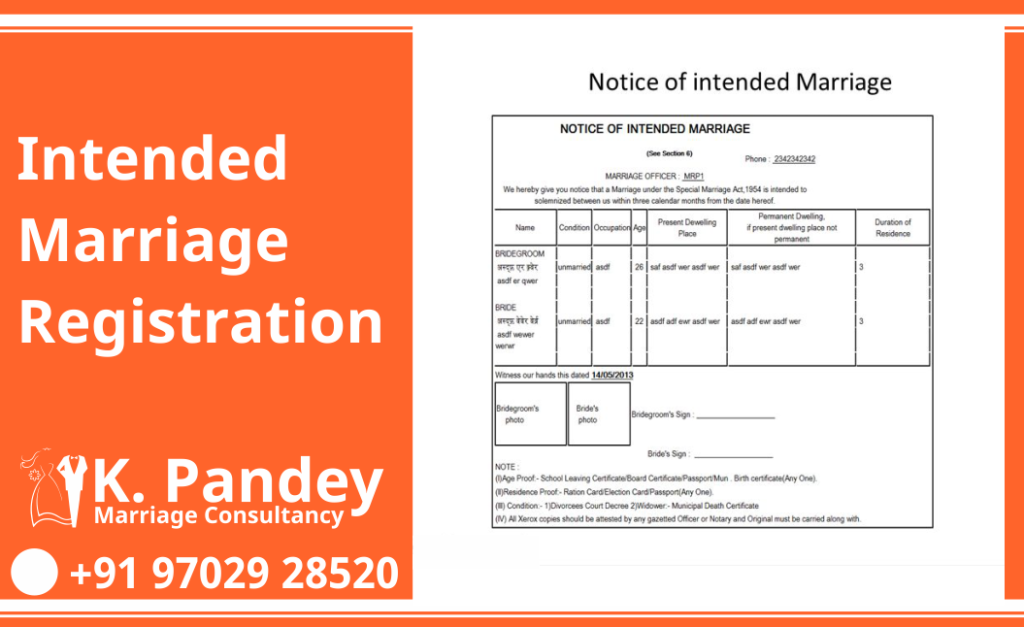Intended Marriage Registration Process in Mumbai

In the vibrant city of Mumbai, where love stories come alive against a backdrop of diversity and unity, the process of registering an intended marriage takes center stage. This page sheds light on the essential steps involved, the significance of legal registration, and the key role played by the Special Marriage Registration Act in Intended Marriage Registration Process in Mumbai.
Imagine a world where love transcends boundaries and celebrates the union of two souls without constraints. Mumbai’s intended marriage registration process is a testament to this idea. It allows couples to embark on their lifelong journey with simplicity, ensuring their commitment is legally recognized.
Beyond the grandeur of wedding celebrations lies the profound importance of registering an intended marriage. It’s not just about paperwork; it’s about securing your future together, protecting your rights and responsibilities, and ensuring that your love story is officially acknowledged by the law.
How to apply for Court Marriage Registration in Mumbai?
At the heart of this process lies the Special Marriage Registration Act, a legal framework that grants couples the freedom to marry irrespective of their religion, caste, or creed. It is a beacon of secular matrimony, allowing love to be the guiding force in marriage, unrestricted by traditional or religious boundaries.
Key Steps in the Intended Marriage Registration Process:
Step 1: Filing the Intended Marriage Notice
The process begins with the submission of the Intended Marriage Notice to the Marriage Registrar. This notice serves as a formal declaration of your intent to marry. Both partners should visit the Marriage Registrar’s Office and fill out the notice form. The notice includes personal information, details about the intended marriage, and other necessary information.
Step 2: Publication of the Notice
Once the notice is submitted, it is typically published in a local newspaper. This publication is a legal requirement to allow for objections from the public. It is an important part of the transparency and legal process.
Step 3: Objections and Investigations
After the publication of the notice, there is a waiting period during which the public can raise objections if they have valid concerns regarding the intended marriage. The registrar’s office will investigate any objections to ensure they are legitimate. If there are no objections or if the objections are resolved, the process proceeds.
Step 4: Marriage Registration Ceremony
The actual marriage registration ceremony is a crucial step. Both partners, along with three witnesses, should appear in person at the registrar’s office on the scheduled date. During this ceremony, you and your partner will make a declaration of your commitment to each other in front of the registrar and witnesses. After the vows are exchanged, you will sign the marriage register.
Step 5: Issuance of Marriage Certificate
Following the successful completion of the registration ceremony, the registrar will issue a marriage certificate. This document serves as legal proof of your marriage and is important for various legal and administrative purposes, such as changing marital status on official documents or inheritance rights.
Eligibility for the Court Marriage Registration in Mumbai
To get married in court in Mumbai or anywhere else in India, you need to meet certain requirements. These include:
- Age: Both parties must be at least 21 years old for males and 18 years old for females. However, it’s best to check with the marriage registrar’s office in Mumbai for accurate details.
- Mental Capacity: Both parties should have a clear mind and be able to understand what marriage means.
- Consent: Both parties should agree to the marriage without being forced or pressured into it.
- Prohibited Relationships: Avoid marrying close relatives, as specified in the Special Marriage Act.
- Marital Status: Both individuals should be unmarried or not currently in a valid marriage. If either party was previously married, they must be legally separated, divorced, or the previous spouse must be deceased.
- Legal Impediments: There should be no court orders or injunctions preventing the marriage.
- Residence: There is usually no specific residency requirement for court marriage in Mumbai. However, you may need to provide proof of your presence, depending on local regulations.
For precise and up-to-date information on court marriage eligibility and documentation, consult a marriage registrar’s office or a legal professional in Mumbai. It’s always recommended to seek advice from local authorities due to varying procedures in different jurisdictions.
Documents required for the bride and groom in Mumbai
Before proceeding with the intended marriage registration process, it’s crucial to ensure that you have all the necessary documents in order. The following is a comprehensive list of essential documents that are typically required for intended marriage registration in Mumbai:
Proof of Identity:
- Valid passports
- Aadhar cards
- Voter ID cards
- Driver’s licenses
- Any other government-issued photo identification
Proof of Age:
- Birth certificates
- School or college certificates
- Passports (which also serve as proof of age)
Proof of Residence:
- Voter ID cards
- Aadhar cards
- Passport with current address
- Recent utility bills (electricity, water, or gas bills)
Affidavits:
- Sworn affidavits from both parties declaring their intent to marry and confirming their eligibility as per the Special Marriage Registration Act.
- Affidavits should be on non-judicial stamp paper and signed by a notary public.
Photographs:
- Passport-sized photographs of both individuals (usually four to six copies).
Proof of Divorce or Death (if applicable):
- If either party has been previously married and is now divorced or widowed, relevant documents such as the divorce decree absolute or the death certificate of the former spouse should be provided.
Documents required for three witnesses
To be a witness at a court marriage in Mumbai, you need these documents:
- Identity Proof: Use a government-issued ID like Aadhar card, passport, voter ID, or driver’s license to prove who you are.
- Residence Proof: Show something that proves where you live, like utility bills (electricity, water, gas) or a rental agreement.
- Passport-sized Photographs: You might have to give a few small photos of yourself.
- Age Proof: Sometimes, the Marriage Registrar might ask for proof of your age, like a birth certificate, school leaving certificate, or passport.
Importance of the Marriage Registration Ceremony
Marriage is not just a social commitment but also a legal contract. While the grandeur of traditional weddings is undoubtedly beautiful, the marriage registration ceremony holds its own significance. Here’s why it’s essential:
- Legal Recognition: The marriage registration ceremony is where your commitment to each other becomes a legal fact. It’s the moment when the government acknowledges your union as a lawful marriage. This legal recognition provides various rights and responsibilities, including inheritance rights, social benefits, and more.
- Simplicity: Unlike traditional wedding ceremonies that often involve elaborate rituals and can be time-consuming and expensive, the marriage registration ceremony is simple and straightforward. It focuses on the core commitment between the couple without the distractions of a grand event.
- Freedom of Choice: The simplicity of the registration ceremony also reflects the principle of freedom of choice. You are not bound by religious customs or social expectations. You have the freedom to choose your partner and formalize your relationship without restrictions.
- Time and Cost Efficiency: The registration ceremony is typically much faster and more cost-effective than a traditional wedding. This efficiency can be especially important in a fast-paced city like Mumbai, where time and resources are often at a premium.
- Privacy and Intimacy: The marriage registration ceremony provides a private and intimate setting for couples. It’s a moment to express your commitment to each other without the audience of a large gathering. This privacy can be valued by many couples.
FAQ for you..!
FAQ for Court Marriage Registration in Mumbai:
What Is Intending Marriage Registration?
Intentioned marriage registration (IMR) is the legal process by which two people formally declare their intent to marry each other, then register their union under the Special Marriage Registration Act. Intended marriage registration marks an essential first step toward legally recognized union.
What Is the Special Marriage Registration Act?
Its The Special Marriage Registration Act provides individuals of various backgrounds, faiths, or communities the freedom to marry without religious constraints limiting them – creating a legal framework in India for such unions.
How can I file an intended marriage notice in Mumbai?
In order to file your intended marriage notice in Mumbai, visit your local Marriage Registrar’s Office and complete and submit the appropriate forms with documents that provide evidence of identity, age and residence.
Will publishing of my intended marriage notice be required?
Yes, publication is an integral step in the process. A notice must be published in a local newspaper to allow time for objections and ensure the marriage complies with any legal requirements.
What happens if objections are raised during publication of the notice?
If objections are raised, if appropriate the Marriage Registrar will investigate them to ascertain if there are valid issues to discuss before continuing with the wedding ceremony. If none exist then proceeding can begin as planned.
How long does the intended marriage registration process usually take in Mumbai?
Its Timelines vary but typically range between one week to several months from filing notice until attending a registration ceremony.
Can foreign nationals register an intended marriage in Mumbai?
Yes, foreign nationals can register their intended marriage in Mumbai; however, there may be additional documentation requirements.
Will both partners need to attend for registration of marriage?
Yes, both parties should attend the marriage registration ceremony.
What benefits does intended marriage registration offer?
Registration provides legal recognition, enabling couples to enjoy all the rights and responsibilities that come with marriage without religious constraints dictating how or when their union should occur.
How can I receive assistance for the marriage registration process in Mumbai?
Reach out to your local Marriage Registrar’s Office or hire professionals who specialize in helping couples through this process, they will provide crucial guidance and assistance during registration.









Latest Blogs
